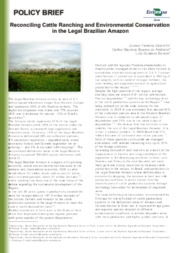Reconciling cattle ranching and environmental conservation in the Legal Brazilian Amazon.
Reconciling cattle ranching and environmental conservation in the Legal Brazilian Amazon.
Author(s): VALENTIM, J. F.; ANDRADE, C. M. S. de; BARIONI, L. G.
Summary: The Legal Brazilian Amazon is a region with growing economic, social and environmental relevance in the national and international scenarios. With a cattle heard above 70 million heads and an area of native and cultivated pastures above 61 million hectares cattle ranching has been one of the main focus of the debate regarding the sustainable development of the Region In the last 30 years, gains in productivity avoided need for incorporation of 147.5 million hectares of the biomes Cerrado and Amazon to the cattle production systems in the Legal Amazon to meet the current world demand for meat. Studies conducted at farm level in the State of Acre show that improved mixed grass-legume pastures with grass species of the genera Braquiaria or Panicum and the legumes Pueraria phaseoloides or Arachis pintoi managed correctly can allow farmers to sustainably maintain stocking rates of 2.5-2.7 animal units/hectare (1 animal unit is equivalent to 450 kg of live weight), with no need of nitrogen fertilizer, the most limiting and expensive nutrient to agricultural production in the tropics. .
Publication year: 2010
Types of publication: Booklets
Unit: Embrapa Acre
Keywords: Acre, Amazonia Occidental, Amazônia Ocidental, Amendoim forrageiro, Arachis pintoi, Brachiaria, Cacahuetes forrajeros, Capim Brachiaria, Capim Colonião, Environmental impact, Forage grasses, Forage legumes, Forage peanut, Ganado, Gramínea Forrageira, Grazing management, Kudzu, Leguminosa Forrageira, Leguminosas forrajeras, Livestock, Manejo de pastoreo, Panicum Maximum, Pastagem, Pastos forrajeros, Pecuária, Proteção Ambiental, Pueraria Phaseoloides, Western Amazon
Observation
Some of Embrapa's publications are published as ePub files. To read them, use or download one of the following free software options to your computer or mobile device. Android: Google Play Books; IOS: iBooks; Windows and Linux: Calibre.
Access other publications
Access the Agricultural Research Database (BDPA) to consult Embrapa's full library collection and records.
Visit Embrapa Bookstore to purchase books and other publications sold by Embrapa.

